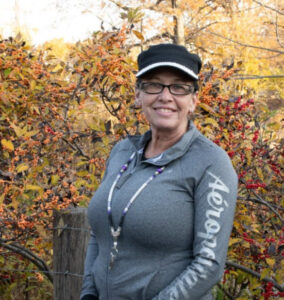
By Ellie Shechet | November 22, 2024
Angela Ferguson, a member of the Onondaga Nation (Eel Clan), is supervisor of the Onondaga Nation Farm and a member of Braiding the Sacred, a grassroots network of Indigenous corn growers.
Known as a leader in the Indigenous food sovereignty movement, Ferguson helps grow and distribute food for members of the Onondaga Nation while helping to care for and redistribute a collection of over a thousand varieties of seeds, some up to 4,000 years old, belonging to Indigenous people and Nations.
The Onondaga Nation is part of the Haudenosaunee Confederacy, an alliance of six Nations whose ancestral territory covers  much of what is now called upstate New York. The Onondaga Nation has filed suit to regain rights to their land, most recently taking their case to an international panel.
much of what is now called upstate New York. The Onondaga Nation has filed suit to regain rights to their land, most recently taking their case to an international panel.
We spoke with Ferguson, who is working with Brooklyn Botanic Garden’s Interpretation team as an advisor, about what food sovereignty means in her community, traditional Haudenosaunee agricultural practices in use at the Onondaga Nation Farm today, and the importance of saving seeds.
Do you remember the first time you grew food?
Growing food was not just part of our lives, but part of our education too. At school, we always had programs that were based around agriculture. I was born and raised on the Tuscarora Nation, which is about three hours from my homeland, Onondaga Nation, and when I moved back to Onondaga Nation, I just continued to grow my own stuff in the backyard. I started doing more collective planting for community in 2010. I worked in an elders’ garden here that we had in the community. In that garden, we grew food for the elders that couldn’t do it anymore. We used to pass out the foods to them for free.
Was food sovereignty something you always thought about?
No, not really. My life was like everybody else’s, busy and into modern things. A lot of colonial foods and fast foods had become a big part of my life. But I think once you return to your roots, it triggers something in your DNA to make you realize, those things are not good for us.
My real motivation for going into food sovereignty was because I noticed that a lot of our communities focus on reducing the harm and effects of alcohol and drugs, but nobody was really focusing on the harm and effects of food-related illnesses.
Food-related illness has been a huge concern not just in my own community, but all Indigenous communities, and all communities in general. Heart disease, diabetes, strokes, all of these things are food-related illnesses, and the only way we’re going to get cured is if we return to our ancestral foods and start feeding ourselves again.
When people ask you to define food sovereignty, how do you explain it? What does that mean to you?
Well, it’s hard, because a lot of those words in the English language don’t have a literal translation into our languages—things like regenerative agriculture, organic farming, heirloom seeds. Food sovereignty sort of became a buzzword; people were talking about it, and there were some big organizations that were really doing the work to make it happen.
But in my definition, it’s truly just coming back to Haudenosaunee ways and our agriculture, because all of our ceremonial cycles are based around food. Food sovereignty is returning to your ancestral ways, growing your traditional foods on your own land, and utilizing that gift to return it to the community.
